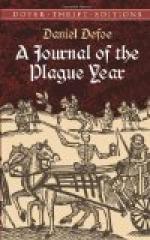[15] Attempts to believe the evil lessened.
[16] Was.
[17] Were.
[18] The chief executive officer of the city of London still bears this title.
[19] One of the many instances in which Defoe mixes his tenses.
[20] Whom. We shall find many more instances of Defoe’s misuse of this form, as also of others (see Introduction, p. 15).
[21] Used almost in its original sense of a military barrier.
[22] Whom.
[23] See Matt, xxvii. 40; Mark xv. 30; Luke xxiii. 35.
[24] Denial.
[25] The civil war between the Royalists and the Parliamentarians, 1642-51.
[26] Whom.
[27] This argument is neatly introduced to account for the narrator’s staying in the city at all, when he could easily have escaped.
[28] Explained by the two following phrases.
[29] Whom.
[30] “Lay close to me,” i.e., was constantly in my mind.
[31] Kept safe from the plague.
[32] “My times are in thy hand” (Ps. xxxi. 15).
[33] Dorking is about twenty miles southwest of London.
[34] Rather St. Martin’s-in-the-Fields and St. Giles’s.
[35] Was.
[36] Charles II. and his courtiers. The immunity of Oxford was doubtless due to good drainage and general cleanliness.
[37] Eccl. xii. 5.
[38] Have seen.
[39] Nor. This misuse of “or” for “nor” is frequent with Defoe.
[40] The four inns of court in London which have the exclusive right of calling to the bar, are the Inner Temple, the Middle Temple, Lincoln’s Inn, and Gray’s Inn. The Temple is so called because it was once the home of the Knights Templars.
[41] The city proper, i.e., the part within the walls, as distinguished from that without.
[42] Were.
[43] The population of London at this time was probably about half a million. It is now about six millions. (See Macaulay’s History, chap. iii.)
[44] Acel’dama, the field of blood (see Matt. xxvii. 8).
[45] Phlegmatic hypochondriac is a contradiction in terms; for “phlegmatic” means “impassive, self-restrained,” while “hypochondriac” means “morbidly anxious” (about one’s health). Defoe’s lack of scholarship was a common jest among his more learned adversaries, such as Swift, and Pope.
[46] It was in this very plague year that Newton formulated his theory of gravitation. Incredible as it may seem, at this same date even such men as Dryden held to a belief in astrology.
[47] William Lilly was the most famous astrologer and almanac maker of the time. In Butler’s Hudibras he is satirized under the name of Sidrophel.
[48] Poor Robin’s Almanack was first published in 1661 or 1662, and was ascribed to Robert Herrick, the poet.
[49] See Rev. xviii. 4.
[50] Jonah iii. 4.
[51] Flavius Josephus, the author of the History of the Jewish Wars. He is supposed to have died in the last decade of the first century A.D.




